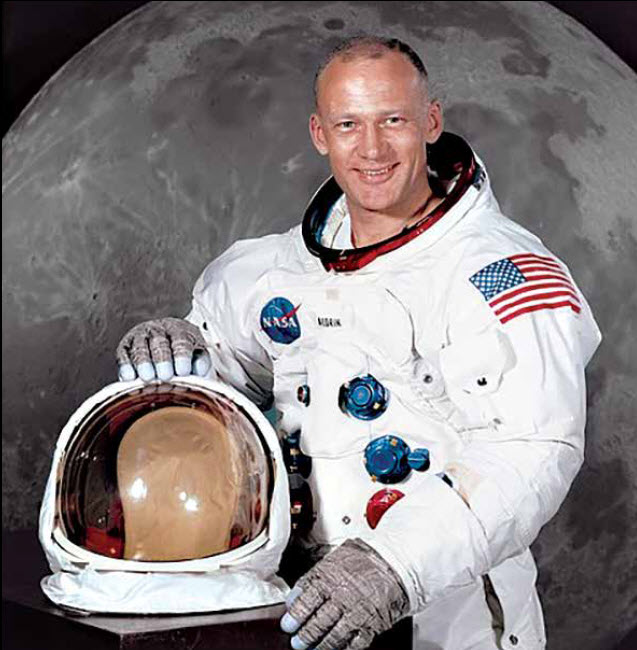By: Mae Lewis
You could say that he was an overachiever.
Edwin Eugene “Buzz” Aldrin Jr. was born on January 20, 1930, to a military family in New Jersey. He was a bright student and a star athlete, graduating third in his class at West Point with a BS in mechanical engineering. After serving in Korea and Germany as an Air Force pilot (for which he was highly decorated), he went on to receive a Doctorate of Science in Astronautics at MIT.
Aldrin was handpicked by NASA in 1963 to join a team of astronauts. His thesis at MIT had been on manned orbital rendezvous, and his expertise created docking techniques for spacecraft that became critical components of spaceflight, and are still used today. Aldrin also developed training techniques underwater that would simulate spacewalking. He was the first man to perform a successful spacewalk on the Gemini 12 orbital mission in 1966.
On July 20, 1969, Buzz Aldrin was one of three astronauts to make the historic Apollo 11 mission to send man to the moon. He was right behind Neil Armstrong as 600 million people –the world’s largest television audience in history – watched him set foot on the moon. He was 39 years old, and he had just performed one of the greatest feats in human history.
“The magnificence of our achievement for humanity was that we were there. But when I looked around I saw the most desolate sight imaginable. No oxygen, no life, just the lunar surface that hasn’t changed for thousands of years — and the blackness of the sky. It was the most desolate thing I could ever think of.”
Four days later, his world came crashing down. As the crew returned to earth, Aldrin became absorbed in negative thinking. His future was over.
Upon returning to earth, during the required three week quarantine, Aldrin began an alcohol bender that lasted for nine years. Shortly after his return to earth, in the midst of being decorated and celebrated, his marriage of 21 years crumbled and ended. His distinguished military career went up in flames.
Only a few years after receiving the Presidential Medal of Freedom, Aldrin was working at a Cadillac dealership, not making a single sale. After flying into a drunken rage with his girlfriend, he was arrested for domestic violence.
Aldrin had gone from the “next big thing” to telling about the next big thing. “What does a man do for an encore?” He had peaked at 39 years old, and had nothing to look forward to.
“I wanted to resume my duties, but there were no duties to resume. There was no goal, no sense of calling, no project worth pouring myself into.”
Who Aldrin was had become more important than who he was becoming. His past was bigger than his future, and it cast a dark shadow over his life. His imagination and zest for life fizzled into depression, lack of meaning, and hopelessness.
It wasn’t until 1978 that Aldrin realized that a lack of vision in his life had driven him to despair, and he sought help. Without a sense of purpose, he had reverted to avoiding pain and pursuing pleasure.
There is a popular notion that you must “discover” your purpose. But your purpose isn’t something you discover, it’s something that you choose. Stop looking for it, and choose it. When you are driven by purpose, you will overcome hurdles and pain in order to become the person you want to be. You will grow and develop and always go on to achieve. You will “never be the former anything.”
With a new sense of purpose and a love for life and adventure, Aldrin went on to serve on the Board of Directors for the National Association for Mental Health. He has written nine books, several of which have detailed his struggles and journey of personal growth. He has been sober since 1978. Today he serves on the Space Advisory Committee of the United States and remains a “Global Statesman for Space.”
“One truth I have discovered for sure: When you believe that all things are possible and you are willing to work hard to accomplish your goals, you can achieve the next “impossible” dream. No dream is too high!”
“Pick an amazing dream and go for it. Don’t merely make a living; make a life. Launch out farther than you’ve ever gone before. Today, you have a shot at forever.”
― Buzz Aldrin, No Dream Is Too High: Life Lessons From A Man Who Walked On The Moon
By: Mae Lewis






